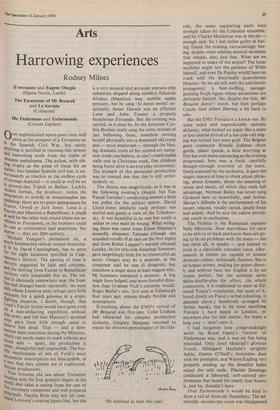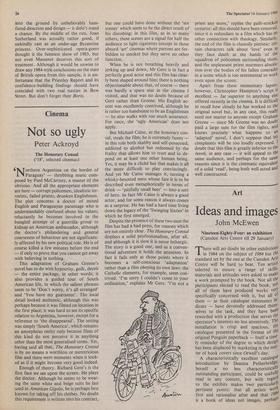Arts
Harrowing experiences
Rodney Milnes
II trovatore and Eugene Onegin
(Opera North, Leeds) The Excursions of Mr Broucek
and La traviata
(Coliseum)
Die Fledermaus and Esclarmonde
(Covent Garden)
Over-sophisticated opera-goers may well yawn at the prospect of a Trovatore set in the Spanish Civil War, but surely anything is justified in rescuing this serious and harrowing work from the realm of en,. stume melodrama. The action, with sib- ling rivalry as the point of focus for an earlier, less familiar Spanish civil war, is un- fortunately as timeless as the endless cycle of revenge depicted — it could as well be set in present-day Tripoli or Belfast. Luckily Andrei Serban, the producer, resists the temptation to overdo or sensationalise the IIPdating: there are no guest appearances by Franco, Orwell or Jack Jones. Luna is a Fascist and Manrico a Republican; it could as well be the other way round (there are no villains in Trovatore), or the brothers could be cast as communists and anarchists. No matter — they are 20th-century. Michael Yeargan's permanent set, a nach-bombarded railway station beautiful- ly lit by David Cunningham, has to serve for the eight locations specified in Cam- inarano's libretto. The passing of time is cleverly suggested by light and costume, acid the shifting from Fascist to Republican territory only marginally less so. The sta- tion is obviously somewhere near the front line and changes hands repeatedly: the nuns With whom Leonora seeks refuge carry little suitcases for a quick getaway in a street- Lighting situation. I doubt, though, that tina's Fascist brutes would have gone even °n a nun-abducting expedition without side-arms, and felt that Manrico's sprained wrist gave them little enough cause to tl g i elleve him dead. That — and a slow- motion mass execution during the Miserere, which can surely make its mark without any srtial aids — apart, the production is .°er, thoughtful and responsible. The hor- ,9 Ie implications of one of Verdi's most Pessimistic masterpieces are inescapable, in a way that they seldom are in traditional, fustian productions. That tiresome old saw about Trovatore needing only the four greatest singers in the world also takes a caning from the cast of five extremely competent and well prepared ineipals. Natalia Rom may not yet com- mand Leonora's soaring legato line, but she
is a very musical and accurate soprano (the cabalettas skipped along nimbly); Eduardo Alvarez (Manrico) may wobble under pressure, but he sang 'Ai nostri monti' ex- quisitely; James Dietsch was an efficient Luna and John Tranter a properly thunderous Ferrando. But the evening was carried, as it must be, by the Azucena: Cyn- thia Buchan really sang the notes instead of just bellowing them, somehow turning herself physically into a demented old crone and — most important — through the blaz- ing dramatic truth of her second-act narra- tion made one believe, in one's comfortable stalls seat in Christmas week, that children being burnt alive is an everyday occurrence. The strength of this particular production was to remind one that this is still unfor- tunately so.
The chorus was magnificent, as it was in the following evening's Onegin, but Yan Pascal Tortelier's conducting seemed a little too polite for the subject matter. David Lloyd-Jones similarly took perhaps too wistful and gauzy a view of the Tchaikov- sky. It was beautiful in its way but surely a wither or two must be wrung. What wring- ing there was came from Eilene Hannan's inwardly eloquent Tatyana (though she sounded vocally ill at ease on the first night) and from Robin Leggate's warmly phrased Lensky. In the title-role Jonathan Summers gave surprisingly little for so resourceful an actor: Onegin may be a monster, as the composer said he was (I disagree), but somehow a singer must at least suggest why. Mr Summers remained a monster. A wig might have helped, and more forceful direc- tion than Graham Vick's certainly would. Roger Butlin's sets, first seen at Edinburgh four years ago, remain ideally flexible and atmospheric.
Everything about the ENO's revival of Mr Broucek was first-rate. Colin Graham had rehearsed his complex production tirelessly, Gregory Dempsey returned to repeat his virtuoso performance of the title-
'He resolved to turn this year.'
role, the many supporting parts were strongly taken by the Coliseum ensemble, and Sir Charles Mackerras was in the pit enough said. So I feel rather guilty at hav- ing found the evening excruciatingly bor- ing, despite some sublime musical moments that remain, alas, just that. What are we supposed to make of the action? The lunar aesthetes might test the patience of Wilde himself, and even Dr Paisley would have no truck with the doctrinally quarrelsome Hussites. So we are left with the anti-heroic protagonist, a beer-swilling, sausage- guzzling Svejk-figure whose attractions are definitely limited. No, despite the title, Mr Broucek doesn't travel, but then perhaps Czechs find Albert Herring a bit hard to take.
But the ENO Traviata is a knock-out. By some weird and unpredictable operatic alchemy, what looked on paper like a more or less routine revival of a ten-year-old stag- ing was turned into pure gold. The Belgian guest conductor Ronald Zollman chose gentle, pliant speeds, a little worrying at first but ever more convincing as the evening progressed: here was a fresh, carefully thought-through overview of the score, finely executed by the orchestra. It gave the singers masses of time to think about phras- ing, about dynamic, about the meaning of words and music, of which they took full advantage. Norman Bailey has never sung Germont here so beautifully, and Arthur Davies's Alfredo is the performance of his career, relaxed, vocally varied, ideally fresh and ardent. And he acts the callow provin- cial youth to perfection.
The Violetta is the Romanian soprano Nelly Miricioiu. How marvellous for once to be able to sit back and know there are go- ing to be no problems with the notes — she has them all, in spades — and instead to revel in a classically schooled voice, silky- smooth in timbre yet capable of intense dramatic colour, technically flawless. She is an honest actress, making her points direct- ly and without fuss; her English is by no means perfect, but she certainly earns alpha-double-plus for effort. (In which connection, it is traditional to sneer at Ed- mund Tracey's translation, but most of it, based closely on Piave's verbal colouring, is damned clever.) Sensitively re-staged by Stefan Janski, this is the most satisfying Traviata I have heard in London, or anywhere else for that matter, for many a long year — don't miss it.
I had forgotten how cringe-makingly awful the Royal Opera's 'version' of Fledermaus was, and it was no fun being reminded. Only Josef Meinrad's glorious Frosch, Hildegard Heichele's sprightly' Adele, Dennis O'Neill's fortissimo duet with the prompter, and Wayne Eagling very properly sending up the dreadful ballet raised the odd smile. Placido Domingo conducted a laboured, soft-centred per- formance that lasted for nearly four hours: it, and he, shouldn't have.
Over Esclarmonde it would be kind to draw a veil of three-ply flannelette. The ad- mittedly second-rate score was bludgeoned into the ground by unbelievably ham- fisted direction and design — it didn't stand a chance. By the middle of the run, Joan Sutherland was actually rather good, if unkindly cast as an under-age Byzantine princess. Over-sophisticated opera-goers thought it the funniest show of 1983, but not even Massenet deserves this sort of treatment. Although it would be unwise to draw any 1984-style conclusions on the state of British opera from this sample, it is un- fortunate that the Priestley Report and its confidence-building findings should have coincided with two real nasties in Bow Street. But don't forget their Boris.







































 Previous page
Previous page